Balancing Corporate & Homesteading Lifestyles
Our Newest Addition: Black Copper Maran

The Marans chicken is a distinctive and highly valued breed known for its exceptionally dark brown eggs, a characteristic that sets it apart from other poultry breeds. Originating from Marans, France, this breed not only boasts beautiful eggshell coloration but also has a rich history and a set of traits that make it a favorite among poultry enthusiasts worldwide.
History and Background
The Marans breed was developed in the early 1900s in the Marans region of France, a port town, which played a significant role in its development.
Nurturing Mind And Spirit: Deepening Wellness Through Gardening

The act of gardening unfolds as a deeply enriching experience, far surpassing the simple cultivation of plants. It serves as a potent therapeutic tool, intertwining physical activity, mental clarity, and emotional nourishment. This intimate engagement with the cycle of life offers profound benefits for mental health and wellness, presenting a natural, accessible means of fostering a sense of peace and fulfillment.
A Path to Mindfulness and Stress Reduction
Gardening anchors us in the present moment, demanding our full attention and engagement with the living tapestry of the natural world. This mindfulness practice helps dissolve stress and anxiety, as it requires a focus on immediate, tangible tasks—whether it's the precise act of sowing seeds, the rhythmic motion of weeding, or the gentle care in watering plants. These simple, meditative actions encourage a state of flow, where worries recede, and a peaceful mindfulness prevails.
Suggestion: Begin each gardening session with a few deep breaths, consciously releasing tension and centering yourself in the present moment. Set an intention for your time in the garden, whether it's to nurture your plants, observe the details of their growth, or simply enjoy the tranquility of nature.
Physical Health Meets Mental Well-Being
The physical activity involved in gardening—from digging and planting to bending and stretching—serves not only to cultivate the earth but also to strengthen the body. This physical engagement releases endorphins, the body's natural stress-relievers, promoting a sense of calm and happiness. Moreover, exposure to sunlight increases vitamin D levels, further enhancing mood.
Suggestion: Tailor your gardening activities to your physical capabilities, ensuring that you enjoy the benefits without strain. Use ergonomic tools and take regular breaks to stretch or rest, making your gardening practice a source of physical well-being as well as pleasure.
A Sense of Achievement and Connection
Gardening offers the unique satisfaction of seeing the direct results of your efforts as plants grow, bloom, and bear fruit. This visible progress can be incredibly rewarding, providing a tangible sense of achievement and a reminder of the efficacy of care and patience. Additionally, gardening fosters a deeper connection with the environment, instilling a sense of stewardship and belonging within the natural world.
Suggestion: Keep a garden journal to track your plants' growth, noting successes and learning opportunities. This record not only serves as a practical guide for future gardening endeavors but also as a reflective tool to appreciate your journey and growth alongside your garden.
Creating a Healing Space
Your garden can become a sanctuary for mental and emotional healing, a place where you can unwind and recharge. Designing a space that appeals to your senses can enhance the therapeutic benefits of gardening. Incorporating elements like fragrant flowers, soothing water features, or comfortable seating areas invites relaxation and contemplation.
Suggestion: Dedicate a section of your garden to a mindfulness or meditation corner, perhaps with a small bench surrounded by aromatic plants and a simple water element. Use this space to practice mindfulness exercises, read, or simply enjoy the serenity of your garden.
In essence, gardening nurtures not just the plants within our care but our own inner landscapes, offering a holistic approach to wellness that enriches both mind and spirit. Through this practice, we cultivate a deeper sense of peace, joy, and connectedness, both to ourselves and to the world around us.
Fairy Eggs

Fairy eggs, also known as witch eggs, wind eggs, or cock eggs, are a curious phenomenon in the world of poultry, fascinating both seasoned farmers and backyard chicken enthusiasts alike.
These tiny, yolkless eggs, often found unexpectedly in the nest, carry a charm and mystery that have sparked interest and folklore for centuries. This article delves into the science behind fairy eggs, their historical significance, and what they mean for the health and welfare of your chickens.
Healthy Herbs For Chickens: Nettle

Nettle (Urtica dioica), often overlooked due to its stinging reputation when fresh, is actually a powerhouse of nutrition and health benefits, making it an excellent herb for chickens. Packed with vitamins, minerals, and amino acids, dried nettle offers numerous advantages when included in your flock's diet or living environment. Here's why nettle is a healthy herb for chickens and how you can incorporate it into their care routine.
Nutritional BenefitsNettle is rich in essential nutrients that are beneficial for chicken health, including:
Health BenefitsAdding nettle to your chickens' diet or coop environment can offer several health benefits:
How to Use Nettle for ChickensTo safely introduce nettle to your chickens and reap its benefits, consider the following methods:
Best PracticesWhen introducing nettle or any new food to your chickens' diet, start with small amounts to monitor their reaction. Ensure that nettle is only a supplement to a well-balanced diet and not the primary food source. Always provide fresh water and maintain clean living conditions for your flock. In conclusion, nettle stands out as a healthy herb for chickens, offering a range of benefits from improved feather health to enhanced egg production. By incorporating dried nettle into their diet or coop environment, you can naturally support the health and happiness of your flock. Growing Nettle (Urtica dioica)Difficulty to Grow: Easy Nettle is a hardy and vigorous perennial herb that thrives with minimal intervention, making it one of the easier plants to grow for gardeners of all experience levels. Its resilience and ability to adapt to various conditions contribute to its ease of cultivation. Starting Nettle: Nettle can be started from seeds, cuttings, or root divisions. Seeds can be sown directly into the garden in spring or fall. For a quicker establishment, root divisions or cuttings from an existing plant can be planted directly into their final growing spot. Remember to handle with care to avoid the sting of the mature plant. Soil Requirements: Nettle is not fussy about soil and can grow in a range of soil types, including poor soils. However, it prefers a rich, moist, well-drained soil with a pH of 6 to 7. Nettle tends to thrive in nitrogen-rich conditions. Light Requirements: Nettle grows well in both full sun and partial shade. While it can tolerate a variety of light conditions, a spot with some sunlight will promote more vigorous growth and higher nutritional content in the leaves. Watering: While nettle is relatively drought-tolerant once established, it prefers consistent moisture. Water the plants regularly to keep the soil evenly moist, especially in dry conditions, to encourage lush growth. Spacing: When planting nettle, space the plants or seeds about 12 to 18 inches apart. This spacing allows ample room for growth and helps to manage its spread within the garden. Pruning: Pruning is not typically required for nettle, as it is often harvested before it gets too large. Regular harvesting of the top leaves and stems encourages new growth and prevents the plant from becoming too tall and leggy. Container Growing: Growing nettle in containers is a great way to control its spread and makes it easier to manage. Use a medium to large pot with drainage holes and a quality potting mix. Ensure the soil stays moist and place the container in a spot that receives partial to full sun. Nettle, with its easy-to-grow nature and multitude of benefits ranging from culinary uses to medicinal applications, is a valuable addition to any garden. Just remember to handle with care to avoid the sting, and consider wearing gloves when planting, harvesting, or working with the plant. |
Chicken Treat Recipe: Spring Greens and Herb Salad

With the arrival of spring, the world awakens with fresh greens and herbs, making it the perfect time to treat your chickens to a nutrient-rich salad. This Spring Greens and Herb Salad combines tender young leaves, sprouted grains, and herbs, offering a boost of vitamins, minerals, and antioxidants that support the health and happiness of your flock. Here's how to prepare this delightful seasonal treat:
Ingredients:
- A mix of fresh spring greens (such as lettuce, spinach, kale, and Swiss chard) – these provide essential vitamins and minerals.
- Sprouted grains (like wheat, oats, or barley) – sprouting increases nutrient availability and digestibility.
- Fresh herbs (such as parsley, dill, cilantro, and mint) – herbs are great for overall health, offering various nutritional and medicinal benefits.
- Edible flowers (optional, such as calendula or nasturtium) – these add color and variety, making the treat more enticing, and have health benefits of their own.
- Cooked quinoa or other whole grains (optional) – for added protein and fiber.
- A handful of mealworms or small crickets (optional) – for a protein-packed treat.
Instructions:
- Prepare the Greens and Herbs:
- Wash all the greens, herbs, and edible flowers thoroughly to remove any dirt or chemical residues.
- Chop the greens and herbs into bite-sized pieces to make them easier for your chickens to eat.
- Sprout the Grains:
- A few days before you plan to make the salad, start sprouting the grains. Soak the grains overnight in water, then drain and rinse them. Leave them in a sprouting jar or tray, rinsing a couple of times a day until sprouts begin to appear. This process usually takes 2-3 days.
- Mix the Ingredients:
- In a large bowl, combine the chopped greens, sprouted grains, and fresh herbs. If using, add the edible flowers, cooked quinoa, and mealworms or crickets. Toss gently to mix all the ingredients.
- Serve to Your Chickens:
- Place the salad in a clean, shallow dish, or scatter it in their run or pecking area. Ensure it's easily accessible to all your chickens to prevent bullying.
- Observe and Enjoy:
- Watch as your chickens delight in pecking at their fresh, spring treat. It's not only nutritious but also provides them with a fun and stimulating activity.
Tips for Success:
- Introduce new foods to your chickens gradually to avoid digestive upset.
- Always ensure that your chickens have access to clean, fresh water.
- Remove any uneaten fresh food after a few hours to prevent spoilage and attract pests.
This Spring Greens and Herb Salad is a simple, wholesome way to treat your chickens, encouraging natural foraging behavior and providing them with a variety of nutrients to keep them healthy and happy as they enjoy the fresh bounty of spring.
Choosing The Right Breeds For Your Flock

Choosing the right chicken breeds for your flock is a critical decision that can influence your experience with backyard poultry keeping. Whether you're interested in eggs, meat, companionship, or a combination, understanding the characteristics of different breeds helps ensure your chickens fit well with your lifestyle, environment, and goals.
Here's what you need to know to make an informed choice:
Purpose
First, define what you want from your chickens:
- Egg Production: If eggs are your main goal, consider breeds known for their laying capabilities, such as Leghorns, Rhode Island Reds, or Australorps, which can provide a steady supply of eggs.
- Meat Production: For meat, choose breeds that grow quickly and have a good feed-to-meat conversion ratio, like Cornish Crosses or Jersey Giants.
- Dual-Purpose: Breeds like Plymouth Rocks, Orpingtons, and Sussex chickens offer both reasonable egg production and a good size for meat.
- Ornamental: If you're interested in chickens as pets or for show, breeds like Silkies, Polish, or Cochins, known for their unique appearances and friendly temperaments, might be appealing.
Climate Adaptability
Consider your local climate and choose breeds that can thrive in your weather conditions:
- Cold Tolerance: Breeds with small combs and dense feathering, such as Wyandottes and Chanteclers, are better suited for cold climates as they're less prone to frostbite.
- Heat Tolerance: In warmer climates, breeds with larger combs and wattles, like Leghorns and Andalusians, are preferable as these features help them dissipate heat.
Temperament
The personality of the chicken breed can affect flock dynamics and your enjoyment of them:
- Docile Breeds: Breeds like Buff Orpingtons and Brahmas are known for their calm and friendly nature, making them great for families and as pets.
- Active Breeds: Some breeds, such as Leghorns and Anconas, are more independent and energetic, which might be less ideal for close handling but great for foraging.
Space Requirements
The amount of space you have available can also dictate the best breeds for your situation:
- Backyard or Small Spaces: Bantam breeds or smaller, more docile chickens like Silkies require less space and can be more suitable for smaller yards.
- Large Areas: If you have more space, you can opt for larger breeds or more active foragers, which will appreciate the room to roam.
Egg Color and Size
Egg color and size might also influence your choice of breed, though this is often a matter of personal preference:
- White Eggs: Breeds like Leghorns and Anconas lay white eggs.
- Brown Eggs: Breeds such as Rhode Island Reds and Plymouth Rocks are known for their large brown eggs.
- Blue/Green Eggs: For something a bit different, consider Araucanas, Ameraucanas, or Cream Legbars, which lay eggs in shades of blue and green.
Health and Care Needs
Some breeds are hardier and more resistant to diseases, while others may require more care and attention:
- Research the health predispositions of different breeds and consider your ability to meet their care needs, including space, nutrition, and potential veterinary care.
Integrating New Breeds
If adding to an existing flock, consider the temperament of your current chickens and the newcomers to ensure a smooth integration. Some breeds mix better with others, and understanding the social dynamics of chickens can help prevent issues.
By taking the time to research and consider these factors, you can select chicken breeds that will thrive in your environment, meet your goals, and bring joy to your homesteading experience. Remember, each breed has its unique characteristics and charm, making them a rewarding addition to any backyard or farm.
Here's a list of some of the most common chicken breeds, highlighting their qualities to help you make an informed decision.
Egg-Laying Breeds
- Leghorn
- Size: Medium
- Temperament: Active and can be flighty
- Climate: Adapts well to both hot and cold climates
- Egg Production: Excellent; lays large white eggs
- Rhode Island Red
- Size: Medium to large
- Temperament: Friendly and hardy
- Climate: Very adaptable to cold and moderate climates
- Egg Production: Excellent; lays large brown eggs
- Australorp
- Size: Large
- Temperament: Calm and friendly
- Climate: Hardy in various climates
- Egg Production: High; lays brown eggs
Meat Breeds
- Cornish Cross
- Size: Large
- Temperament: Docile
- Climate: Adaptable, but not as hardy as some breeds due to rapid growth
- Purpose: Primarily raised for meat due to fast growth and large size
- Jersey Giant
- Size: Very large
- Temperament: Gentle giants, calm
- Climate: Good in cold climates due to size and feathering
- Purpose: Dual-purpose but often raised for meat due to large size
Dual-Purpose Breeds
- Plymouth Rock
- Size: Large
- Temperament: Friendly and docile
- Climate: Hardy in cold weather
- Egg Production: Good; lays brown eggs
- Meat: Good quality, suitable for meat production
- Sussex
- Size: Large
- Temperament: Calm and curious
- Climate: Adaptable to both hot and cold climates
- Egg Production: Excellent; lays large brown eggs
- Meat: Good, considered a dual-purpose breed
- Orpington
- Size: Large
- Temperament: Very friendly and docile, great for families
- Climate: Does well in colder climates due to thick feathering
- Egg Production: Good; lays large brown eggs
- Meat: Plentiful meat production
Ornamental Breeds
- Silkie
- Size: Small to medium (bantam size)
- Temperament: Gentle and friendly, excellent pets
- Climate: Better in warmer climates; their unique feathering doesn't repel water well
- Purpose: Primarily ornamental and pet purposes; known for their unique fluffy plumage
- Polish
- Size: Medium
- Temperament: Active and can be skittish
- Climate: Adapts reasonably well but needs protection from the elements due to their fancy feathered crests
- Purpose: Primarily ornamental; known for their striking appearance and elaborate feathered crest
Special Egg Colors
- Ameraucana
- Size: Medium
- Temperament: Friendly and docile
- Climate: Adaptable to various climates
- Egg Production: Good; known for laying blue eggs
- Marans
- Size: Medium to large
- Temperament: Calm and friendly
- Climate: Hardy in various climates
- Egg Production: Good; known for their dark chocolate brown eggs
Each breed offers unique advantages, and your choice should align with your specific needs, preferences, and environment. Whether you prioritize egg production, meat yield, or simply the joy of keeping chickens, there's a breed that fits every backyard flock's requirements.
Deathlacers

At C&C Homestead, we take pride in our unique and captivating hybrids. The Deathlacer, a hybrid breed that embodies the beauty and gentle nature we strive for in our poultry endeavors. Born from a meticulous crossbreeding process exclusive to our homestead, the Deathlacer boasts an extraordinary appearance remarkably sweet temperaments.
Friendly and sociable, these chickens have become not just a part of our daily routines but also a source of joy and companionship.
The Deathlacer chicken represents the pinnacle of our commitment to breeding not only for beauty but for the gentle and amiable nature that makes each interaction with them a delight.

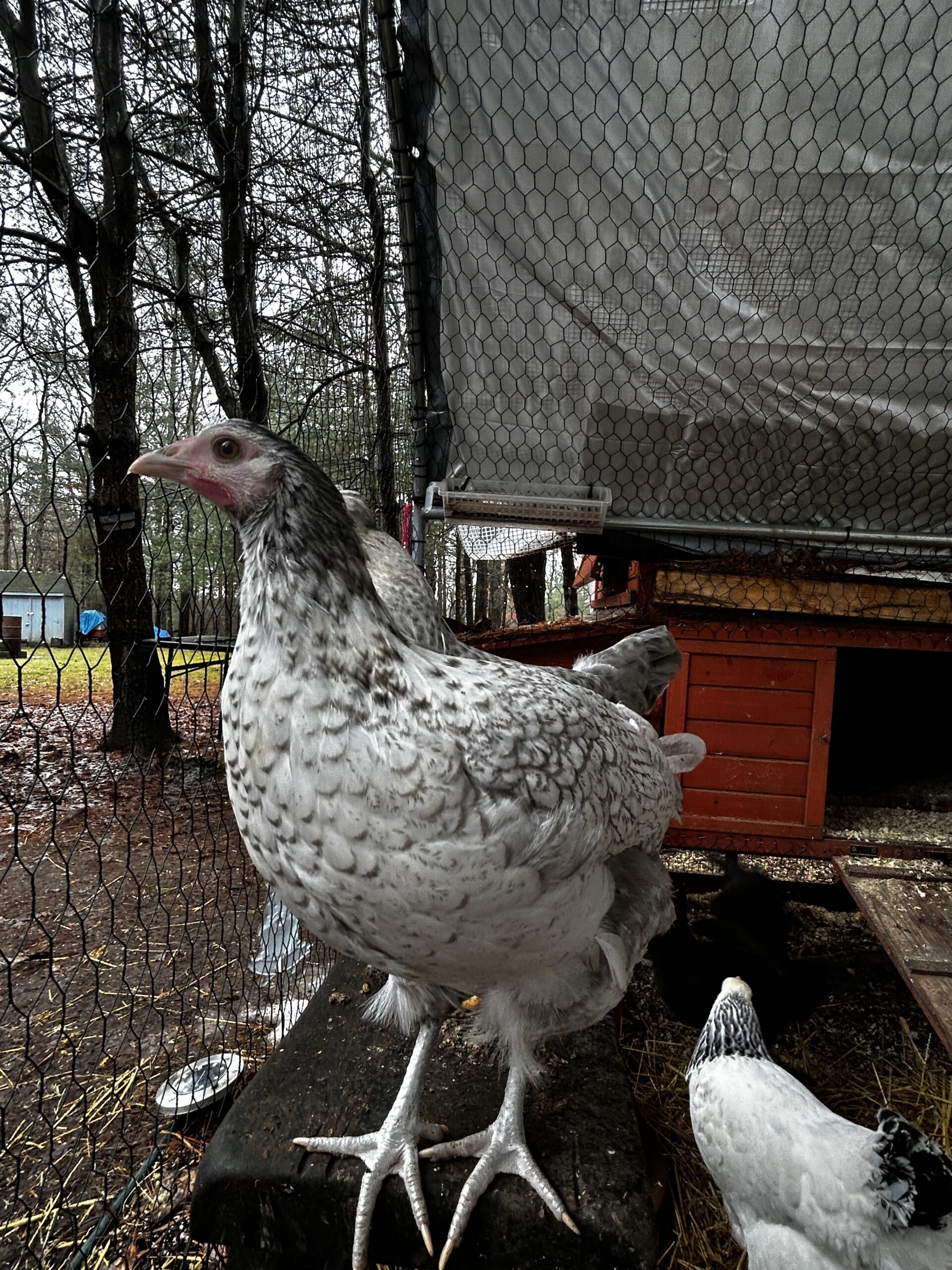

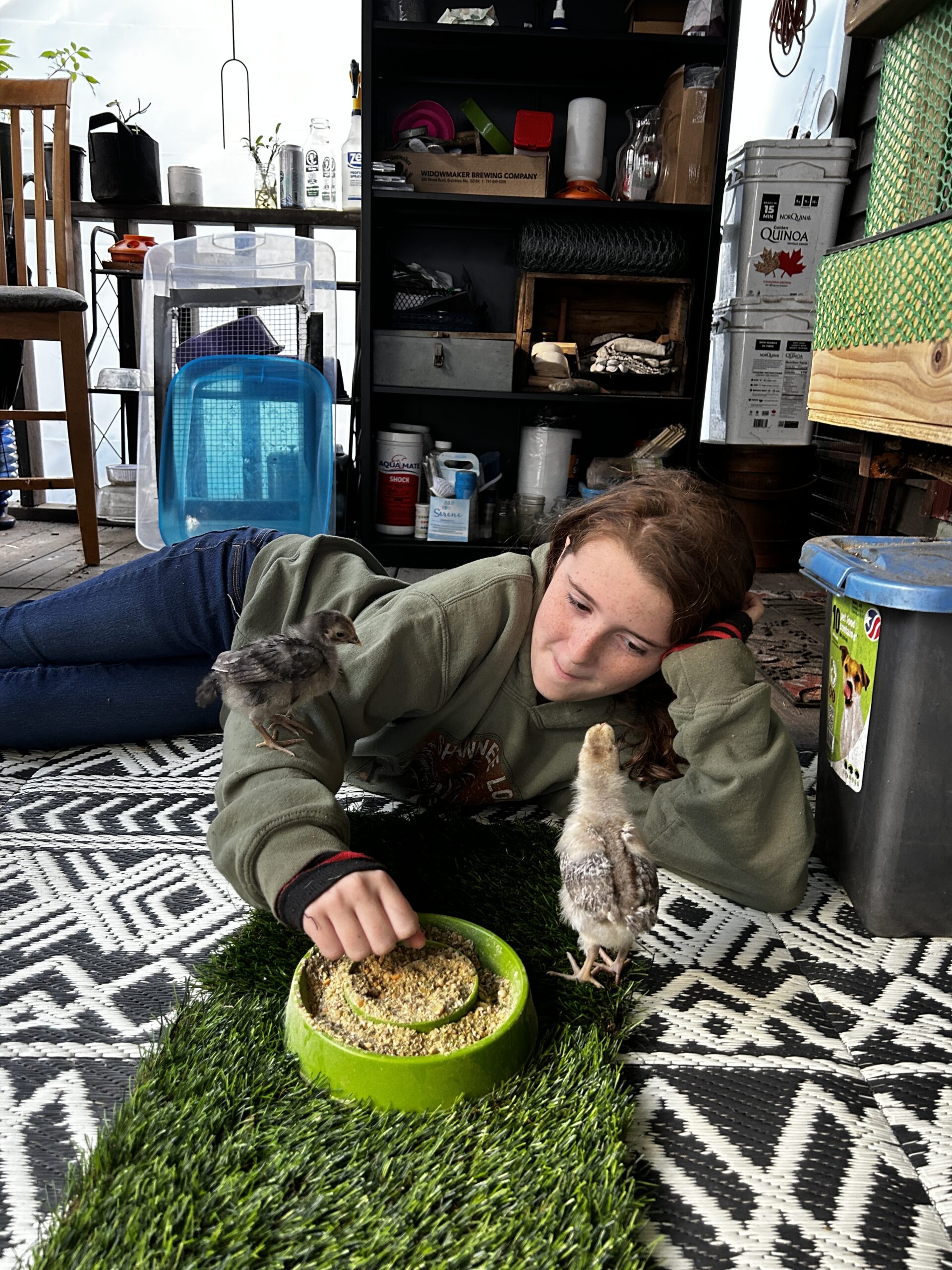
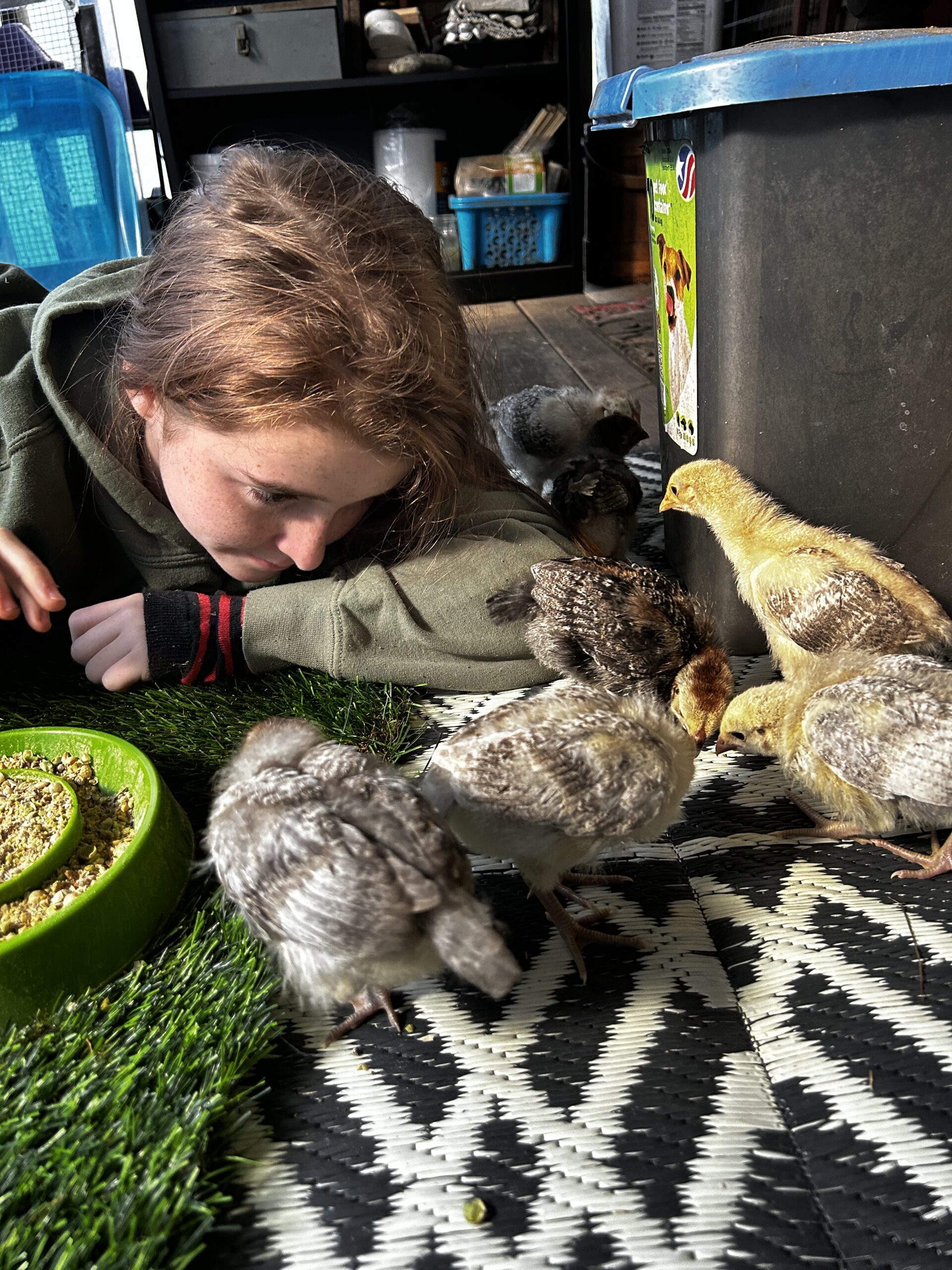
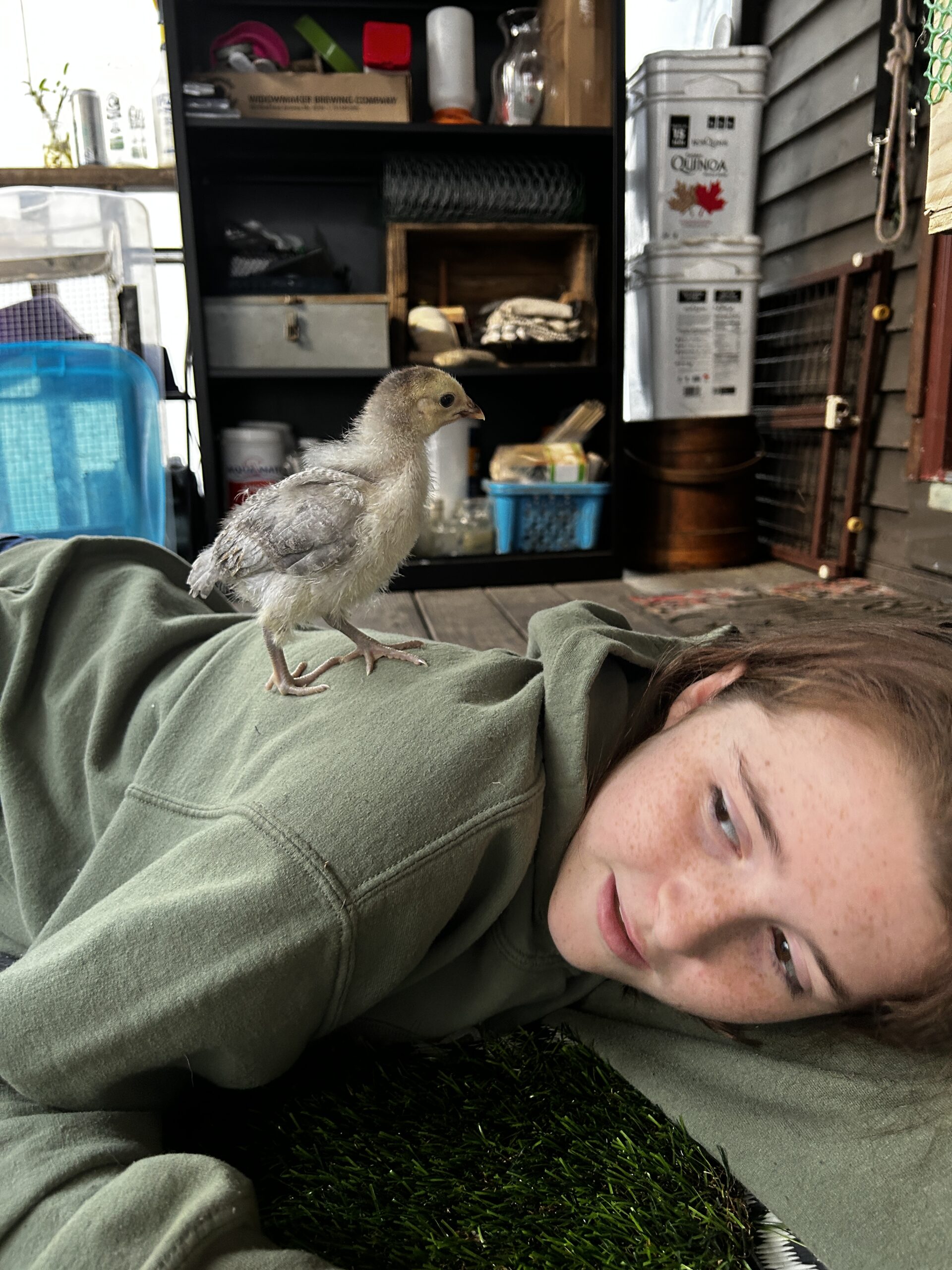




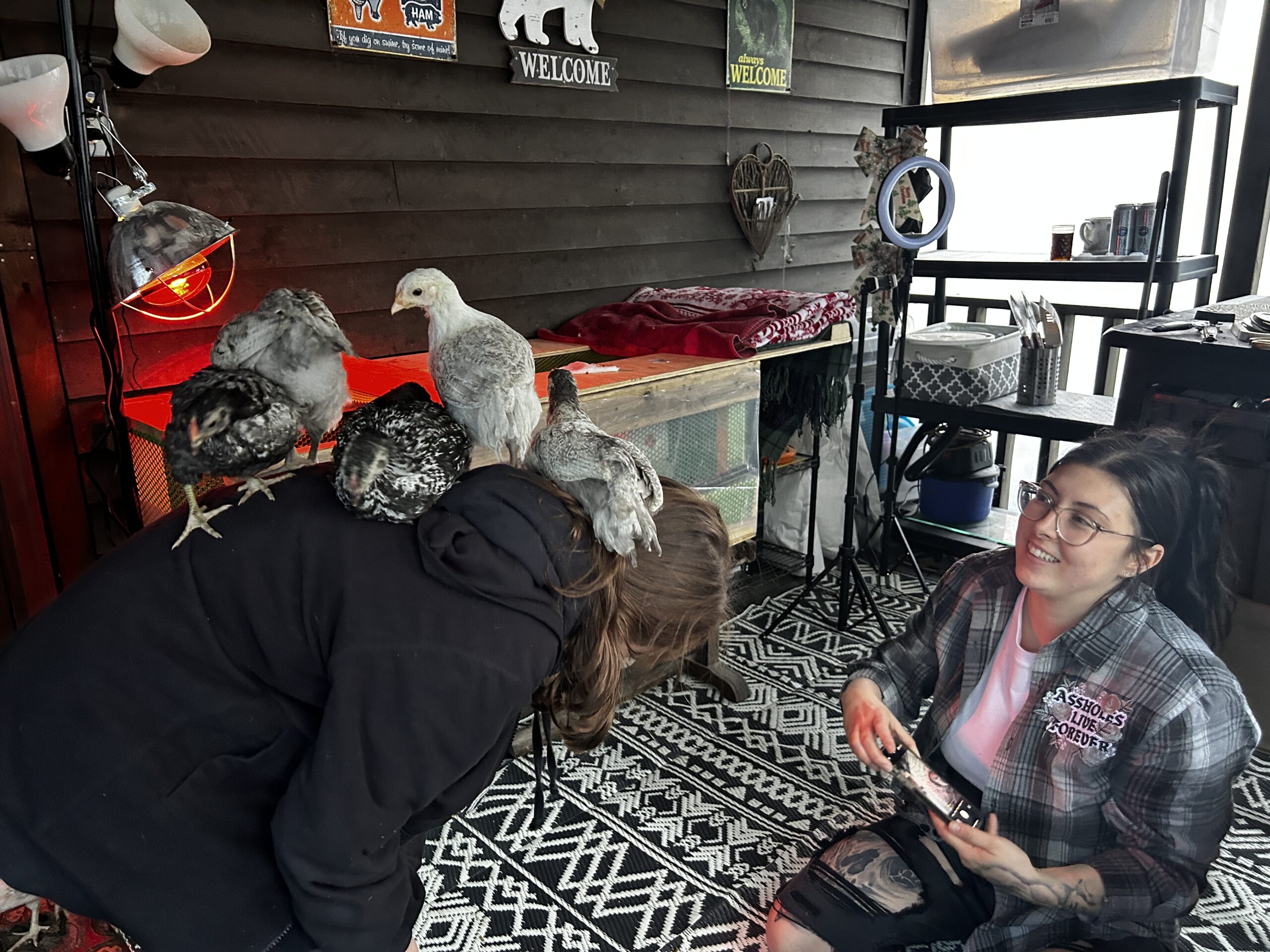



Silver Lakenvelder

The Silver Lakenvelder is an intriguing and historically significant breed of chicken, celebrated for its distinctive beauty and spirited disposition. Tracing its origins back to Germany and the Netherlands during the early 19th century, the breed's name, "Lakenvelder," translates to "white spread over a black field" in Dutch, aptly describing its unique coloration. This visual appeal, combined with its utility, has garnered the Silver Lakenvelder a dedicated following among poultry enthusiasts.
Exchequer Leghorn

The Exchequer Leghorn is a striking and relatively rare variety of the well-known Leghorn chicken breed, celebrated for its distinctive plumage and excellent egg-laying capabilities. Originating from Italy and later refined in Britain and America, the Leghorn breed has been a favorite among poultry enthusiasts for centuries. The Exchequer variation, in particular, boasts an intriguing history and a unique appearance that sets it apart from other Leghorn varieties.
DIY Dust Bath For Your Flock

Creating a dust bath for your chickens is a simple and fun project that will greatly benefit their health and well-being. Chickens naturally bathe in dust to keep themselves clean by removing mites, lice, and other parasites from their feathers and skin. Here's a detailed guide on how to make an effective dust bath for your feathered friends:



